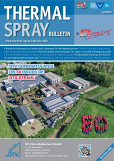Thermal expansion of high entropy alloys for multilayer heating systems
Authors: Prof. Dr.-Ing. Kirsten Bobzin, M. Sc. Hendrik Heinemann, M. Sc. Marvin Erck, M. Sc. Andreas Schacht
DOI: https://doi.org/10.53192/TSB202302106
With a heating element close to the surface, the temperature in plastic injection molding can be dynamically controlled to positively influence the molded part quality. Thermal spraying allows the production of heating coating systems on corresponding mold surfaces. These coating systems consists of an electrically conductive heating coating surrounded by ceramic insulation coatings. Different coefficients of thermal expansion (CTE) of the individual coatings impair the usability and operating life under varying thermal loads. Since the CTE of the ceramic insulation is relatively low, an alloy with a low CTE is required for the heating coating to reduce thermally induced stresses during operation. To reduce the CTE of the high entropy alloy Al0.5CoCrFeNi, Zr and Si in different amounts were added. Dilatometry and differential scanning calorimetry (DSC) were performed to evaluate its suitability for the application as a heating coating. In particular, the CTE decreases with increasing content of Zr, which reduces the thermal mismatch in a multilayer heating system. Since the CTE achieved is lower than that of alloys, which are commonly used as resistive heaters, such as NiCr20, a longer service life as
a heating coating is to be expected.
Pages: 106 - 112







Order this article as a PDF for 8.00 Euro. Send us a short e-mail with your details.
An active subscription enables you to download articles or entire issues as PDF-files. If you already are a subscriber, please login. More information about the subscription








